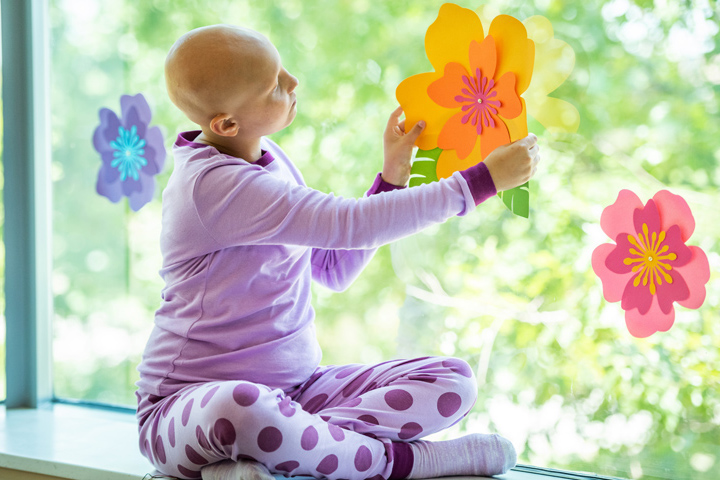By Dr. Alice Ann Holland, PhD, ABPP | Contributor
Having a tween or teenager who is facing a cancer diagnosis can be a terrifying experience. It’s tempting to hide the diagnosis to protect your child from the fear you are experiencing. Telling a tween/teen one of their friends or family members has cancer may be just as difficult. Children of all ages can be fearful of things they do not understand, so although it may seem counterintuitive, being honest and discussing what cancer is and what their diagnosis means can help them feel less anxious.
How to tell your tween/teen they have cancer and explain what that means
When talking with your child about their cancer diagnosis, first use general terms to give the big picture. Then explain the specific terms they’ll be hearing frequently, like “chemo” and “side effects,” and let them know they can ask about other words they don’t understand. Instead of having one conversation, it often is best to break up topics into smaller conversations. This may help your child feel less overwhelmed.
Tweens and especially teenagers are in a developmental phase where they are seeking greater independence. This means they may send mixed signals, needing your support at times but at other times wanting to be left alone. It’s important to be flexible and responsive to your teen’s changing needs. It’s easy to feel rejected and confused when your teen pushes you away at times, so keep in mind this is a normal developmental process they’re navigating while also dealing with a very stressful illness which can exacerbate those mood swings.
For parents, the challenge is in finding a balance between allowing your tween/teen the increased independence they need while also ensuring they have the resources to deal with any negative feelings (e.g., anxiety, sadness, loneliness) which are a normal part of the cancer experience for this age group.
Parents should give space while also making sure they keep the lines of communication open. This could take the form of weekly check-ins to see how your teen is doing emotionally, as well as making sure they know you’re available any time they want to talk. Being proactive in acknowledging the negative emotions associated with cancer can help teens feel more “normal” about this experience and potentially more willing to disclose those emotions.
It also may be helpful to have your tween/teen’s medical team arrange for regular check-ins with one of the hospital psychologists, or to even set up weekly counseling/therapy sessions. This can be framed to teens as simply a useful resource many people find helpful while going through cancer — in other words, it should be made clear that arranging counseling/therapy for your tween/teen is not an indication you’re worried they are “crazy” or that something is wrong with them. Instead, you can talk about how it’s normal to struggle emotionally with a cancer diagnosis and treatment side effects, and how a counselor/therapist is there to help with that. Your tween/teen may not feel like they “need” therapy at that moment, but there may come a point during treatment they will appreciate having that resource available to them. Although therapy/counseling can feel awkward to tweens/teens, give it several sessions to allow them an opportunity to establish rapport with the clinician. If it simply doesn’t seem to be a good personality fit, rather than giving up on counseling/therapy altogether, try finding a different provider. Your tween/teen may be more receptive to the idea of counseling/therapy if he/she is involved in selecting a provider.
For tweens or teens whose friend or family member has cancer
The information above could also apply to tweens or teens in this situation. Some teens may want to spend more time with their friend/family member after finding out. Other teens may prefer to avoid the feelings of fear and sadness that seeing the friend/family member invokes for them. Parents should be respectful of their teen’s reaction either way, while recognizing avoidance of the friend or family member may be a sign their teen is struggling emotionally. Instead of forcing the teen to interact with the friend or family member, parents should first provide emotional support, which could be in the form of a direct conversation with your teen or providing him/her with other resources, such as books to read or other adults to talk to (e.g., a therapist, a counselor, or even a cancer survivor who might be able to provide hope).
Many children who are diagnosed with cancer find they lose friends, even simply due to prolonged absences from school.
If your teen’s friend is diagnosed with cancer and your teen reacts to this by withdrawing from that friend, do what you can to support your teen’s emotions before pushing them toward reaching out to that friend with a text, call, or visit. You also can encourage your teen that it’s okay to feel as though you don’t know what to say to a friend who has cancer. Their friend may or may not want to discuss their diagnosis. The best thing your teen can do for a friend who has cancer is to simply let them know they are loved and help them feel as “normal” as possible. That may mean simply continuing text conversations about shared interests or playing video games together (either physically in person or online). At the extreme end of things your teen might do to help their friend feel “normal” and not so uncomfortably different from his/her peers, your teen might want to shave his/her head in solidarity with their friend who has lost his/her hair. The most important message to convey to your teen is that there is no “right” or “wrong” way to interact with a friend who has been diagnosed with cancer. The most important thing for that friend is that your teen maintains the friendship as best he/she can, and it is essential to recognize that your teen may need increased emotional supports (e.g., counseling/therapy, conversations with parents or other cancer survivors) in order to do so.
No matter the age of your child, parents should also keep in mind the airplane analogy: Put on your own oxygen mask before helping your child. In other words, parents should attend to their own physical and emotional health in order to provide the best support for their child. Accept support from others offering help and don’t hesitate to ask for help from family and friends. Parents may find it helpful to join support groups (in person or online) or even participate in individual therapy or counseling. Many hospitals also have pastoral care providers for parents who desire religious or spiritual support during their child’s treatment.
ABOUT THE AUTHOR:

Alice Ann Holland, Ph.D., ABPP, is a board-certified Pediatric Neuropsychologist, the Research Director of the Neuropsychology Service at Children’s Health and Associate Professor in Psychiatry at UT Southwestern Medical Center.


